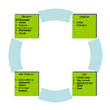Developing a code of personal ethics
01 April 2006
 After failures of the magnitude of Enron and WorldCom, there is an increased need for leaders to adhere to a code of ethics.
After failures of the magnitude of Enron and WorldCom, there is an increased need for leaders to adhere to a code of ethics.
When a leader adheres to the highest standards of ethics, it puts lesser pressure on colleagues, teammates and contemporaries to break the agreed code of ethics. Secondly, adhering to the agreed code of ethics keeps the best interests of various stakeholders in perspective.
However, ethics is a sub branch of philosophy, and is further subdivided into theoretical, normative and applied ethics. Personal ethics is just a part of the whole. So where does one start?
Fig 1. 4 Steps to simple personal code of ethics
Here is a model to evolve a simple, practical and personalised 3-step code of ethics for individuals.
Ethics, by the dictionary definition is the philosophical study of moral values and rules. It tries to define a pattern of behavior that is either desirable or undesirable, and outcomes that are either right or wrong.
 But as is the case with any human interpretation, ethics means different things to different people.
But as is the case with any human interpretation, ethics means different things to different people.
To some extent, ethical behavior of individuals is directly influenced by the context of the decision - for example, the inclination to take the shorter path to long-term goals. An individual's family, community and neighborhood determine ethical conduct to a large extent since they set initial expectations in her formative years. These early impressions influence how each person responds to different challenging circumstances in personal and professional work life later on.
When one grows up, it is common knowledge that ethical standards are under highest threat when the outcome of a decision has a disproportionately high impact on the individual's chance of success. It is also generally accepted that response to such critical stimulus in life determines the way that individual's life progresses.
